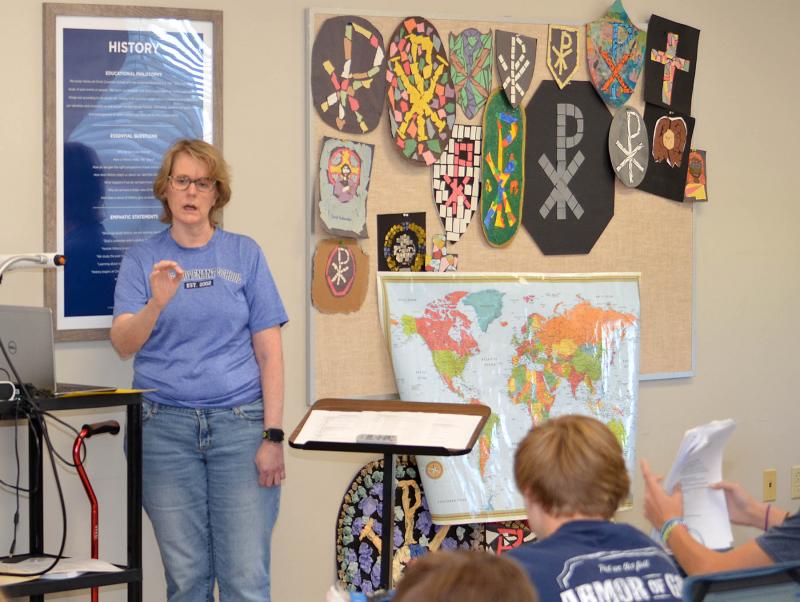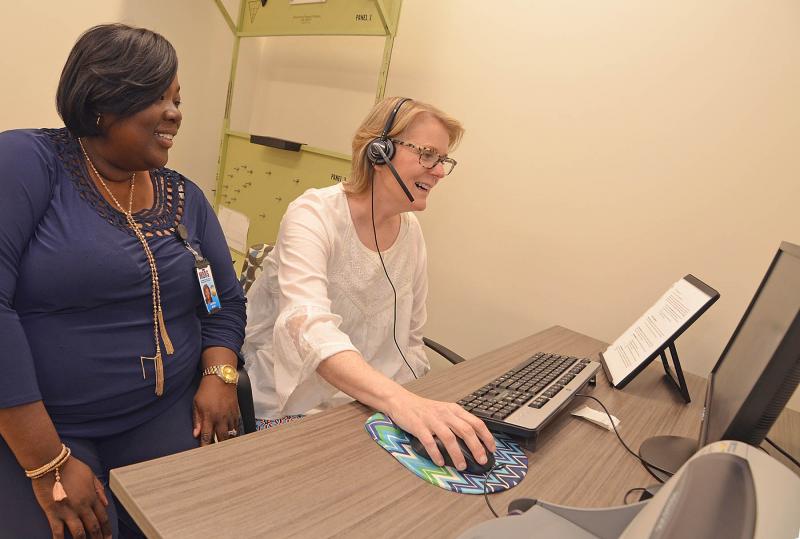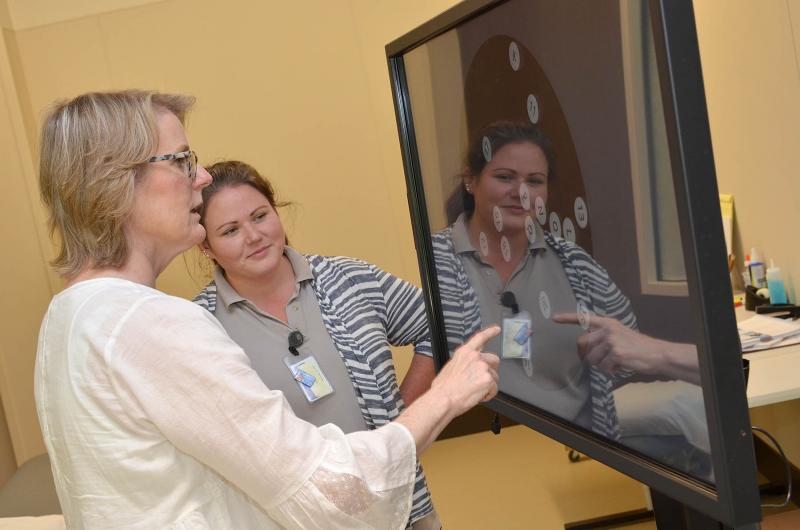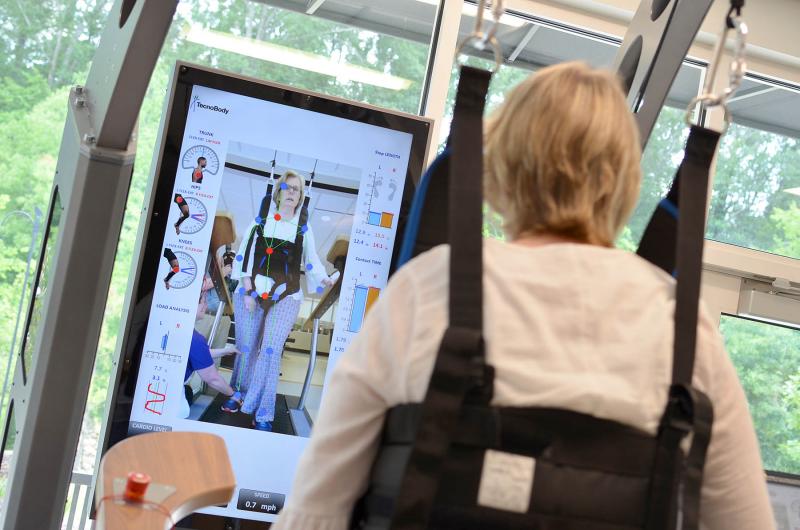Claire Spencer has returned to teaching history at Ridgeland’s Christ Covenant School (CCS), just a year after she suffered a stroke that almost completely paralyzed her left side.
The transformation amazes outpatient occupational therapist Kari Richeson, who treated Spencer while working part-time at Methodist Rehabilitation Center’s inpatient facility in Jackson.
“You always want to reserve hope for people, that’s just what we do,” said Richeson. “But it’s also our job to be realistic. Knowing where Claire sat the day I met her at inpatient, it’s very gratifying to know she has made it this far.”
Richeson has a unique perspective on her recovery, because today she works closely with Spencer at Quest. That’s MRC’s comprehensive outpatient program for people who wish to make a successful return to work, school or home life after a debilitating injury or illness.
“Now to see her standing in front of a classroom doing what’s she’s good at—teaching history to young students and livening up the room—it’s inspirational,” Richeson said.
Spencer’s recovery has been a journey. After the stroke, she spent nearly two months in a nursing home, too frail to undergo rehab.
“When I got to Methodist finally, I was still in pretty bad shape,” Spencer said. “I was still on a feeding tube. They put me on the fifth floor at MRC, and I loved it. I love the people there and it was a great place to be. When I had finally became coherent enough to be aware of where I was, I thought I had gone to the Ritz-Carlton.”
Spencer spent six weeks at MRC, with her goals focused on getting back to teaching.
“They kept talking about this program called Quest that would get me ready to go back to work,” Spencer said. “I really love teaching, so I really wanted to do that. But even at that point I wasn’t sure how I would be able to go back to work.”
At Quest, a team of physical, occupational and speech therapists tailor a treatment plan to each patient. The plan focuses on improving the function necessary to return to what they were doing before their injury or illness. Besides Richeson, physical therapist Erin Perry and speech therapist Cassie Means started working with Spencer in February.
“Between Erin helping me with walking, Cassie helping me with recall and speech and Kari helping me with the everyday stuff, it gave me the confidence to feel like I could do it,” Spencer said. “You know—like they say ‘walking, talking and chewing gum at the same time,’ maybe?”
For many Quest patients like Spencer, securing needed funding can be as challenging as rehab itself. Even for those whose jobs provide insurance, months of intensive therapy may not be covered. The Mississippi Department of Rehabilitation Services (MDRS), a state agency, is dedicated to helping individuals overcome that hurdle.
“I assist Quest patients to either maintain, regain or obtain employment,” said Lakeesha Bogan, a counselor for MDRS. “A lot have insurance, but insurance only covers a certain amount of visits. So once we get their doctor’s prescription saying how much therapy they need, we work with vocational rehab to secure the funding.”
The Office of Vocational Rehabilitation, one of MDRS’ many services, provides funding specifically for disabled persons to return to or find work. Bogan works closely with the staff at Quest to identify patients’ needs and to provide proper documentation to secure funding.
“It’s been very eye-opening to me working with Quest,” Bogan said. “When you see someone in the beginning needing assistance just standing or walking, and then you see the end results—it’s just amazing. The therapists are really, really good at helping people get where they need to be.”
For Spencer, Bogan helped with funding for occupational therapy and necessary home modifications and is working to provide speech-to-text software that will greatly help the schoolteacher with preparing her lessons.
“Lakeesha has been really great, she has facilitated a lot of things for me,” Spencer said. “Any time I’ve had one-on-one interaction with her, she’s been super sweet, easy to talk to, and very encouraging.”
MDRS also provided funding for Spencer to enroll in MRC’s Driving Rehabilitation Program, which assesses drivers’ abilities and makes the necessary recommendations for them to drive safely after an injury or illness.
“That’s been huge,” Spencer said. “Just being able to have that freedom to drive. To know you can just get out and go to the grocery store if you need to.”
While Spencer is now back in the classroom, her recovery continues with regular therapy at Quest.
“I love therapy, I’m going to be so sad when it’s over,” Spencer said. “I call Erin ‘Er Bear’ and I call Kari ‘Ker Bear.’ They’ve been great.”
Perry says that Spencer was very active before her stroke and has focused her physical therapy on helping her get back to that lifestyle.
“We looked at getting equipment that was appropriate for her, and she has gotten a recumbent bike for her home,” Perry said. “She has really made tremendous progress. We’ve used our body weight-supported treadmill extensively and she has progressed with her speed. And she’s greatly improved her foot placement. Working on her standing tolerance, as a teacher who has to direct a classroom, was also a huge part of her therapy.”
Spencer’s therapists also paid a visit to her workplace to identify what her everyday challenges might be.
“They came up to my school and looked at everything to see if there was anything that I would need to adapt to for day-to-day tasks,” Spencer said. “One thing Kari suggested was for me to get a rolling cart. Now I put my laptop on it and teach class. I’ve never been one of those teachers who can just sit behind a desk.”
“We continue to work with her on her mobility and cognitive skills,” Richeson said. “And we’re introducing more functional compensatory strategies like that cart that she can use practically in her work environment.”
Spencer says she is grateful for everyone that has helped her get back to doing what she loves and her family at CCS.
“We recently had a commissioning ceremony where the eighth grade students graduate,” Spencer said. “It was very bittersweet. I cry every time the students leave. We see the students who have been there since kindergarten, all grown up in their big boy and girl clothes. I was so happy that I was able to be there for that. I’m so thankful that I was able to get rehab and to get back in the classroom. It means a lot.”
But as happy as Spencer has been to return to work, her school family is equally pleased to see her back.
“It has been a blessing to our students and faculty to have Mrs. Spencer back in the classroom at CCS,” said Cathy Haynie, head of school at CCS. “Watching her perseverance and hard work to get to this point is truly an inspiration. Who she is as a teacher, her love of the subject matter and of her students, did not waver and actually served as motivation for her recovery. We are grateful for her dedication to her calling and proud to have her as a CCS teacher.”




